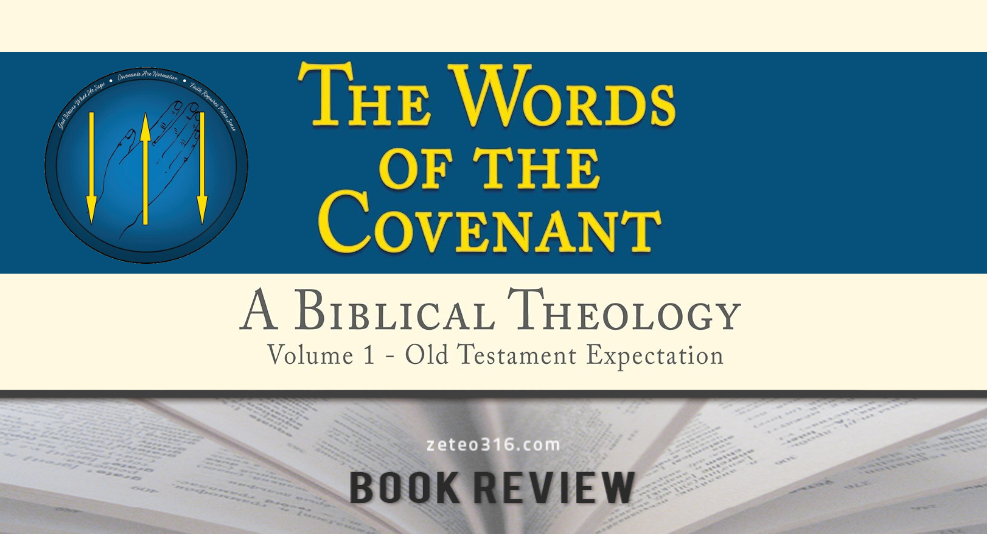
This is a review of the book The Words of the Covenant: A Biblical Theology Volume 1 – Old Testament Expectation, by Dr. Paul Martin Henebury – published by Xulon Press Elite (Paperback 467 Pages).
Some Background
I came across Paul Henebury many years ago through his blog “Dr. Reluctant.” He refers to himself as “A Reluctant Dispensationalist.” To find out why, you’ll have to look it up for yourself. One of the things he states is that,
“Any approach to theology must be concerned with only one thing – its adequacy as an explanation of the whole Bible.”
In other words, Dr. Henebury does not bind himself to any particular system or tradition – he prefers to let the Bible speak for itself. Now I know that many reading this will agree that this is their stance as well, and that this is the reason why they believe what they believe. However, in practise, this isn’t always the case. Sometimes tradition trumps Scripture.
The Words of the Covenant is a valiant attempt to let Scripture speak for itself and allow the chips to fall where they may. This is what one consistently finds in Dr. Reluctant’s blog, and the book doesn’t disappoint. In a Footnote on page 19, the writer mentions a personal discussion with a friend (Tony Garland). This is a sample, which I thought encapsulated Dr. Henebury’s approach,
“The intention of the Bible is to speak across both history and culture. If it were trapped in either, it could not perform the function which God intends.” ~ Tony Garland
Covenants and The Creation Project
As a “dispensationalist” the writer is a proponent of Biblical Covenantalism rather than the more popular dispensations approach. These covenants are not those of Covenant Theology – they are inductively derived from the Bible, rather than from tradition or a Catechism.
The book describes what these biblical covenants are, how they work and what they say about God’s character etc. For example: How do God’s character and the covenants affect Israel?
Early in the book, readers are introduced to The Creation Project. What is it? I agree with the following from his summary of Part One,
“Creation ought to be viewed as a Project, begun on Genesis 1 and reaching its conclusion in Revelation 21 and 22. The Epic of Creation reflects more on what is done for God rather than what God has done for us.” (Page 71)
The Book’s Structure
The Words of the Covenant is divided into Seven Parts and 30 Chapters. Each chapter has several sub-headings. At the end of each Part is a helpful “Summary and Conclusions” for that section. This reflects Dr. Henebury’s teaching side.
There are 3 Appendices: 1) The Interstestamental Period; 2) The Cosmic Temple and Spiritualized Eschatology; 3) The Apocalyptic (Wrong) Turn.
There is a Bibliography, Name Index and Scripture Index. I would have also liked a Subject Index, though Kindle readers can always do a search.
My copy of the book is 467 pages. I should note, however, that the font is small and each page is word dense. In a different format, this would end up being considerably larger.
Recommended Reading
One of the strengths of the book is its prolific Footnotes. Paul Henebury is widely read and this is one place where it clearly shows. He is both familiar with Covenant, New Covenant Theology and Dispensational works and skillfully interacts with all of these.
Where he disagrees with others, he does so in an irenic manner. Moreover, he avoids imposing his view where the text is unclear or ambiguous. He is content to let a difficult verse speak for itself and advises waiting for a future clarification. I appreciate this humility and devotion to the texts.
Those of us who love prophecy will appreciate his insights into the prophets – what they say and what their functions were etc. I also particularly enjoyed the section on the Psalms.
In conclusion, everyone interested in what the Bible has to say ought to read this book, but especially premillennialists. It is information dense – a Grand Tour of the Old Testament. Don’t expect it to sink through in the first reading. It stands as an excellent resource to go back to often.
Keep an eye out for Volume 2, covering The New Testament.
Thank you, Paul Henebury for your passion to teach, and to serve God. This is a highly recommended work which, in my opinion, easily stands shoulder to shoulder with the likes of Vlach’s “He Will Reign Forever” and McClain’s “The Greatness of the Kingdom.”
A brief note
One reviewer has criticized Dr. Henebury’s view of an aspect of Daniel’s 70 Weeks. He goes so far as to say that his interpretation is “especially cringe worthy”, among other things. I like and respect the reviewer. But I’m disappointed. I’d like to point out that Dr. Henebury is, in fact, in good company here. It is the reviewer who needs to convince others of the correctness of his unique view.
Maranatha!
Purchase
The Words of the Covenant: A Biblical Theology !
Disclosure: This link is an affiliate link meaning, at no additional cost to you, we may get a commission if you make a purchase. Thanks for your support in this way!
Read our Full Disclosure policy here.

